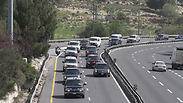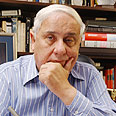
The road to Jerusalem is being expanded these days. Dozens of tractors and heavy mechanical equipment are eating away at the mountains surrounding the city, and thousands of tons of rocks and white limestone are being ground in the wind. What was once green and brown has become sparkling white, and the air is filled with particles of dust. The mountains dance like rams under the iron grinders, and hills disappear from the eye like sheep being searched for by the shepherd.
Soon there will be wide road to Jerusalem, and only the memories of this bloody route are becoming shorter.
Only 66 years ago, a short period of time in historical terms of nations and people, there was a narrow road here, two lanes within a suffocating valley on both sides. Those who took hold of the mountains and hills on both sides of the road won the battles – even if they eventually lost the war – and the Arab gangs gathered on the top of the mountains from the right and from the left, so that anyone trying to enter the road leading up to Jerusalem paid with his life.
These things sound imaginary for those who arrive in Jerusalem and exit it today: Here people shot and killed? Here people tried to break the siege? Here?
The war here wasn't over the home – it was inside the home. Hundreds of young people were killed here on the margins of the road. "Here lie our bodies, a long long row," the poem says about them. But in 1948 there was no time for poems. Here people fought for life and for death, a lot of death, the Givati and Alexandroni brigades – especially in Operation Nachshon – and Harel, especially Harel, one of the Palmach brigades.
Harel was put in charge of this road, which thousands and perhaps tens of thousands of cars drive through every day and every night these days. A total of 403 young men and women, members of this brigade and many others, escorting convoys, paid with their lives so that we would be able to drive there comfortably today.
And does anyone remember the Harel fighters today? There is a bridge named after them. There is also a kibbutz. A year ago, a garden named after the brigade was inaugurated in Jerusalem in the presence of the IDF chief of staff and Jerusalem mayor. The handful of Harel fighters who are still alive came to meet up, some accompanied by Filipino caregivers. Many nice words were said, and they promised not to forget Harel. But they did.
Nineteen years after the War of Independence, it appeared that the road to Jerusalem winding between the mountains would no longer face danger – when the paratroopers returned, despite the threat posed by the Jordanian villages on the other side of the road, on the other side of the border.
Forty-seven years have passed since the Six-Day War, and last week, at the end of another memorial ceremony, we left Jerusalem for Tel Aviv in a comfortable car. Forty-seven years have passed since that war, and the person who at the time served as an operations officer in the Paratroopers Brigade, Jerusalem's liberators, did not forget:
"This is the village of Beit Iksa," he said, pointing at the village overlooking the road. His Jerusalem is not golden, his Jerusalem is made of lead, the lead to which he lost so many of his friends.
It's a 45-minute journey from Jerusalem to Tel Aviv. Jerusalem may know how to remember, Tel Aviv may want to forget. Two cities, which on the State of Israel's 66th Independence Day look and sound as if they belong to two different countries.
















